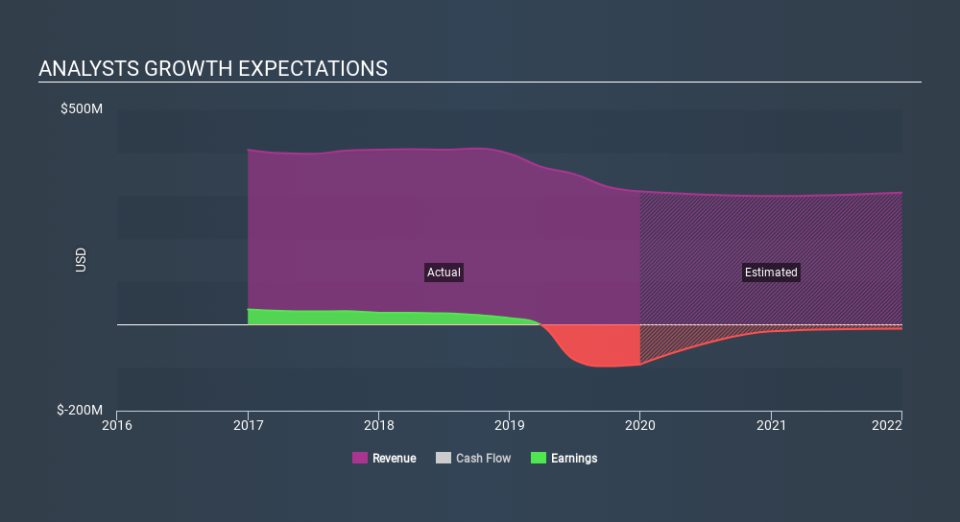Nautilus, Inc. Analysts Are Pretty Bullish On The Stock After Recent Results

Shareholders of Nautilus, Inc. (NYSE:NLS) will be pleased this week, given that the stock price is up 13% to US$3.31 following its latest yearly results. Nautilus reported revenues of US$309m, in line with expectations, but it unfortunately also reported (statutory) losses of US$3.13 per share, which were slightly larger than expected. Analysts typically update their forecasts at each earnings report, and we can judge from their estimates whether their view of the company has changed or if there are any new concerns to be aware of. We've gathered the most recent statutory forecasts to see whether analysts have changed their earnings models, following these results.
Check out our latest analysis for Nautilus
Taking into account the latest results, the three analysts covering Nautilus provided consensus estimates of US$298.7m revenue in 2020, which would reflect a small 3.4% decline on its sales over the past 12 months. Per-share statutory losses are expected to explode, reaching US$0.52 per share. Before this earnings announcement, analysts had been forecasting revenues of US$298.0m and losses of US$0.54 per share in 2020. There was no real change to the revenue estimates, but analysts do seem more bullish on earnings, given the modest lift to earnings per share expectations following these results.
These new estimates led to the consensus price target rising 31% to US$4.25, with lower forecast losses suggesting things could be looking up for Nautilus. It could also be instructive to look at the range of analyst estimates, to evaluate how different the outlier opinions are from the mean. Currently, the most bullish analyst values Nautilus at US$6.00 per share, while the most bearish prices it at US$2.00. This is a fairly broad spread of estimates, suggesting that analysts are forecasting a wide range of possible outcomes for the business.
One way to get more context on these forecasts is to look at how they compare to both past performance, and how other companies in the same industry are performing. These estimates imply that sales are expected to slow, with a forecast revenue decline of 3.4% a significant reduction from annual growth of 2.8% over the last five years. Compare this with our data, which suggests that other companies in the same market are, in aggregate, expected to see their revenue grow 15% next year. So although its revenues are forecast to shrink, this cloud does not come with a silver lining - analysts also expect Nautilus to grow slower than the wider market.
The Bottom Line
The most important thing to take away is that analysts increased their loss per share estimates for next year. Fortunately, analysts also reconfirmed their revenue estimates, suggesting sales are tracking in line with expectations - although our data does suggest that Nautilus's revenues are expected to perform worse than the wider market. Analysts also upgraded their price target, suggesting that analysts believe the intrinsic value of the business is likely to improve over time.
Even so, the longer term trajectory of the business is much more important for the value creation of shareholders. At Simply Wall St, we have a full range of analyst estimates for Nautilus going out to 2021, and you can see them free on our platform here..
It might also be worth considering whether Nautilus's debt load is appropriate, using our debt analysis tools on the Simply Wall St platform, here.
If you spot an error that warrants correction, please contact the editor at editorial-team@simplywallst.com. This article by Simply Wall St is general in nature. It does not constitute a recommendation to buy or sell any stock, and does not take account of your objectives, or your financial situation. Simply Wall St has no position in the stocks mentioned.
We aim to bring you long-term focused research analysis driven by fundamental data. Note that our analysis may not factor in the latest price-sensitive company announcements or qualitative material. Thank you for reading.


